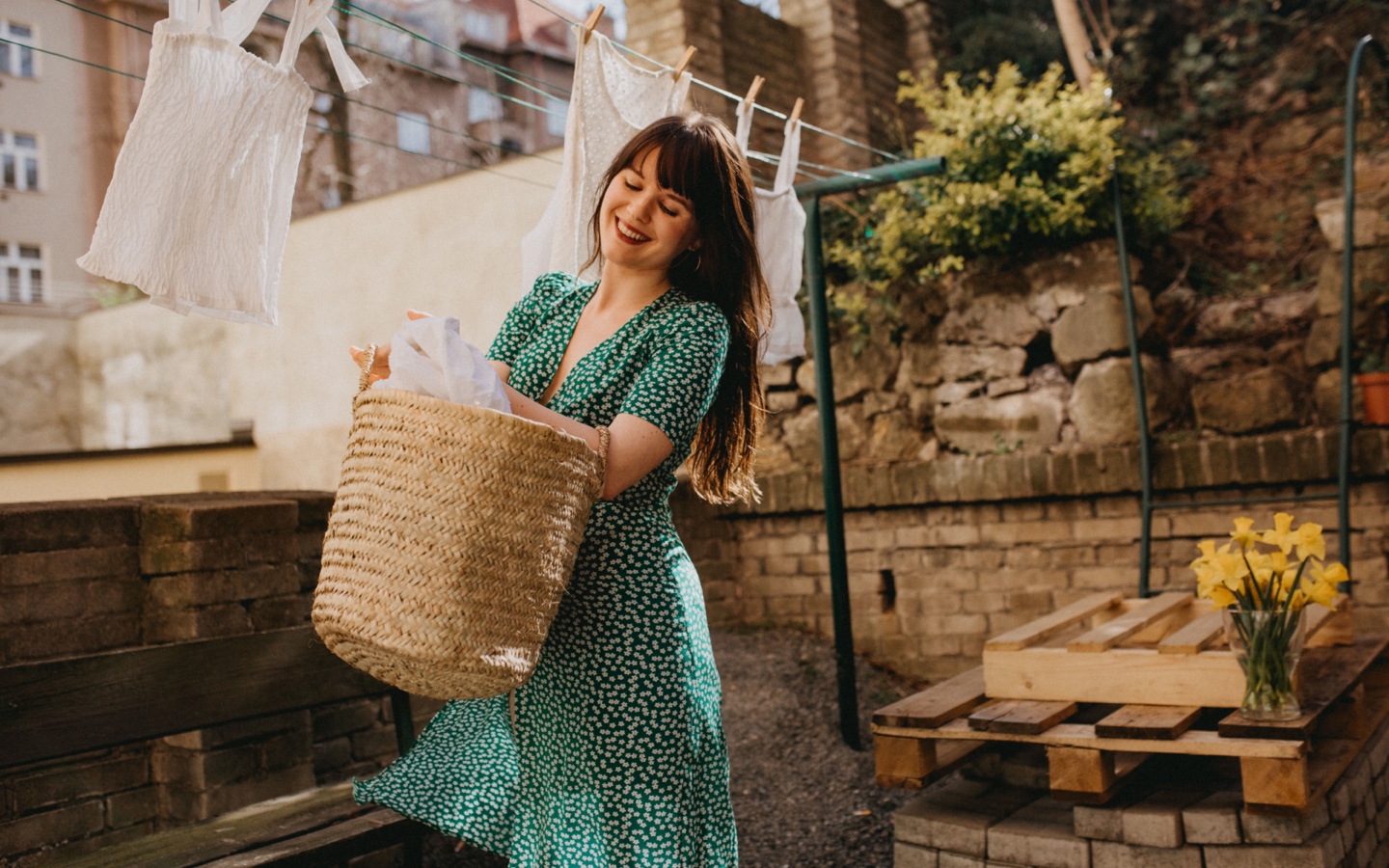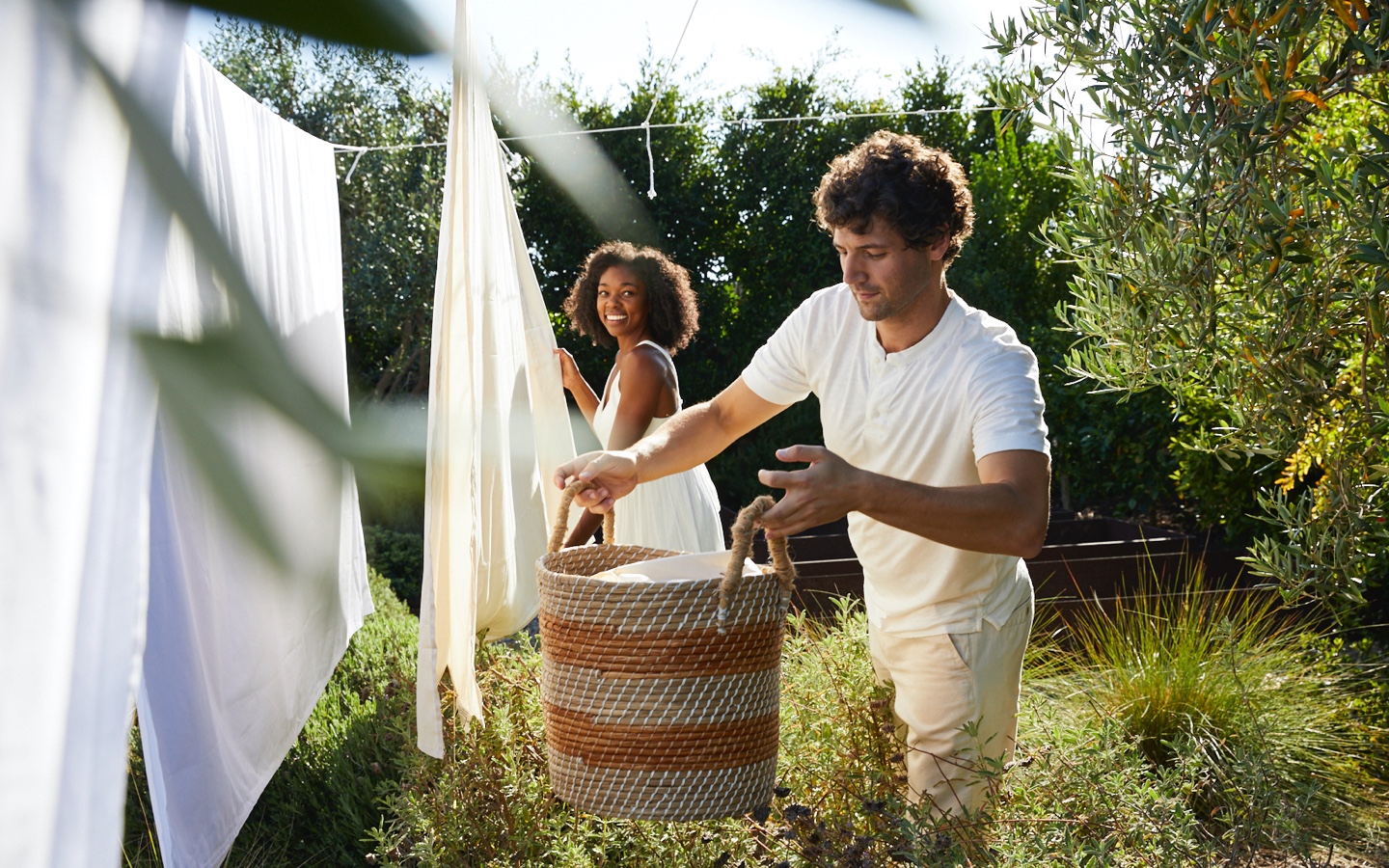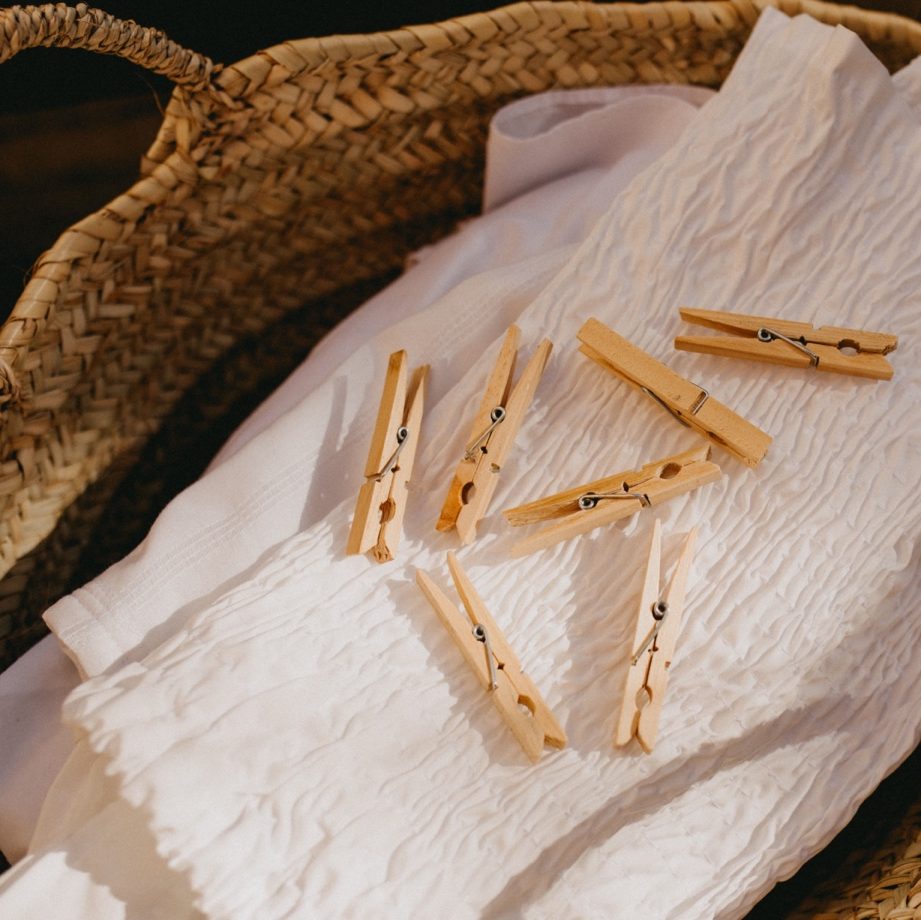Dryer sheets, fabric softeners, and traditional detergents are all damaging to our health — and the planet’s. These safe, effective, and affordable tips make it simple to replace them.
Washing, drying, folding — keeping our clothes clean is an essential chore we perform out of necessity, and often without considering the environmental impacts. The average American household does nearly 400 loads of laundry a year.
The impacts are significant. Whether you do your laundry at home or at a laundromat, the water consumption of washing machines might surprise you. If you’re using an older washing machine at home, a single large load of laundry could cost you 41 gallons of water per load, and a commercial washer isn’t much better, using a little more than 34 gallons per load. That’s a lot of water, especially when you consider those 400 annual loads of laundry we’re doing.
The impact isn’t solely relegated to the washer, either: drying clothes in a regular, non-Energy Star dryer could account for as much as 6 percent of a home’s energy use. These impacts aren’t solely detrimental to the environment. They’re reflected immediately in your wallet, too. If you’re using an outdated appliance, you could be spending an extra $135 per year on energy alone to do your laundry.

Replacing appliances like washing machines and dryers with Energy Star appliances not only saves you money over time, but drastically reduces water and energy usage (in the case of water usage, an Energy Star washer typically only uses 10 gallons of water per load). The impact of laundering on the environment isn’t only measured in gallons of water and energy used, or the number reflected on your water and energy bill. The detergent, softening agent, dryer sheets and other soaps and cleansers used to get those clothes clean and smelling fresh pose a very real threat to marine life and the overall health of the planet. In fact, the emissions coming from your dryer vent emit hazardous chemicals into the air –— including two carcinogens.
Traditional ways of doing laundry are on their way out, slowly being replaced as knowledge of their environmental impacts grows. But waiting for the tide to turn on it’s own takes time, so why not be ahead of the curve? Greening your laundry routine is one of the simplest ways to make a positive impact on the planet while also improving your own wellbeing.
Use a Safe Detergent
Conventional scented laundry products, like detergents and dryer sheets, contain harmful phosphates, additives known as “builders” used to improve the cleaning power of detergents. These builders help clean your clothes, but they’re also caustic for the environment and your body, causing damaging algae blooms in lakes and rivers and causing kidney and skin damage. You may be thinking that phosphates are a necessity for their cleaning power, but grocery stores are now lined with plenty of phosphate-free detergents. Some alternative products use plant- and vegetable-based ingredients that are not only biodegradable but effective and gentler on skin, too.
Instead of reaching for the same old detergent on your next shopping trip, look for an option that’s made from natural ingredients and comes in a recyclable container, like this option from The Simply Co. And don’t forget to replace your stain-removing products, which often contain super-concentrated amounts of the same chemicals and fragrances found in detergents. A package-free stain remover bar works just as well.
Replace Your Fabric Softeners
If you love the feel of ultra-soft laundry after using a conventional fabric softener or dryer sheets, you may want to reconsider. Fabric softener, which adds fragrance to clothes and makes them feel soft, contains chemicals found to be highly toxic to humans, including: benzyl acetate (linked to pancreatic cancer), benzyl alcohol (an upper respiratory tract irritant), ethanol (linked to central nervous system disorders), limonene (a known carcinogen), and chloroform (a neurotoxin and carcinogen) (read more here).
So what can you use to replace fabric softener? The solution is likely hiding in your cupboard right now: baking soda or white vinegar. Adding a quarter cup of baking soda to the wash cycle can help soften clothes. And if you’re looking for a fresh scent, soft clothes, and removing static cling, adding a quarter cup of white vinegar to the rinse cycle can take care of all three (don’t worry, the vinegar scent dissipates after drying). Not only are these solutions much friendlier to the environment, they’re friendlier to your wallet, too. Just be sure not to combine these substances with bleach, as the combination is caustic.
Just Say No to Dryer Sheets
Dryer sheets, which are used to reduce static cling and add scent to laundry, contain the same disrupting chemicals as fabric softener. However, they could pose an even greater risk due to the fact that they’re heated in the dryer and their fumes release through the dryer vent. The ingredients in conventional dryer sheets have been linked to central nervous system disorders, headaches, nausea, blood pressure issues, and respiratory issues, among others. Not only that, but most conventional dryer sheets take years to decompose. What’s an alternative to dryer sheets? Wool dryer balls. Made from natural wool, these dryer balls help reduce energy use by helping your laundry dry quicker. Not only that, but scent-lovers can add a few drops of essential oil (we like lavender) to add a fresh, all-natural fragrance to clean laundry.
Making your own dryer sheets is another option. Our DIY dryer sheet tutorial shows you how to make an inexpensive alternative to conventional dryer sheets using fabric, vinegar, and essential oils.

Don’t Forget About the Sun
Who doesn’t love the scent of laundry dried with nothing but fresh air and the sun? If you have the space for a wash line, hanging laundry to dry is one way to dramatically reduce the energy and environmental costs of laundering. No room for a line? Consider air-drying smaller loads of laundry with a collapsible rack that can be easily stored when not in use. Bonus: your clothes will last longer.
What are your tips for greening your laundry routine? Share with us on social by tagging @AvocadoMattress and #AvocadoGreenMagazine!

Shop Pillows
The Essential Organic Pillow Collection
Gentle, breathable, non-toxic support.






